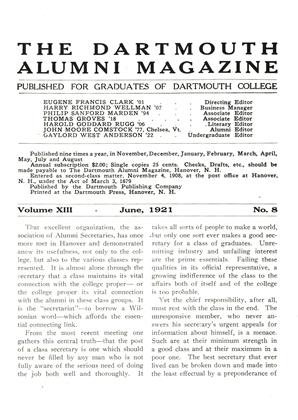In reply to Thomas A. Edison's criticisms of a college education based on the so-called "Edison Questionnaire," the New York World recently printed the letter of President E. M. Hopkins of Dartmouth in reply to the World's request for his opinion as to the validity of the inventor's criticisms. President Hopkins' letter follows.
To the Editor of the World:
I have read with much interest the description of Mr. Edison's questionnaire for college men, and am entirely unimpressed as to its significance either for or against the colleges.
No one knows better than the men in college instruction and college administrative work that the results of the college course upon the men are less complete in developing intellectual capacity than the need of the world makes desirable.
On the other hand, however, the kind of a course which would enable men to answer a set of questions such as Mr. Edison has drawn up would be almost completely wasted. The thing which Mr. Edison seems to demand is an almost perfect illustration of how much less good the influence of a college education might be than it really is.
No sane system of higher education, it seems to me, would devote any considerable time to the pouring into the students' minds of a mass of information much of which, though accepted as true today, is likely to be found incomplete or fallacious tomorrow. The purpose of the college is rather to develop the processes of thought and to make intellectual capacity larger. It would be as unreasonable to estimate a man's material wealth by the money he has in his pocket as it is to measure a man's intellectual equipment by the number of facts that he carries in his mind.
The man of qualities of outstanding leadership in this world is the man who knows where lie the sources of knowledge and where may be found the springs of incentive. The latter man may have resources a thousandfold those of the former man whose capacity is limited to what any commercial memory test would afford him.
If I may venture one further opinion, which is based more even on my experience in industrial organization before I came into college work than on any present day contacts, I believe that any employment office would go far afield in a selection of men solely on the basis of such a questionnaire as Mr. Edison. I believe it to be perfectly possible for a man to be unable to answer any considerable proportion of such questions as have been reported and still to have the intellectual capacity and the genius for constructive thought which would make him in an exceedingly short time outstrip the man who could answer the questionnaire in minute detail. As a matter of fact, my own belief is that the presumption would be against a man's large mental capacity whose mind was encumbered with a litter of such detailed information as that for which Mr. Edison asks.
The colleges of this country need and welcome criticism designed to make men of big dimensions as to mind and as to soul. They cannot, however, utilize suggestion, even though disinterestedly made, that would condemn them to the making of men of the type which would be most likely to qualify under Mr. Edison's test.
 View Full Issue
View Full Issue
More From This Issue
Article
-
 Article
ArticleFraternity Scholarship
December 1932 -
 Article
ArticleBush Kingsford's All-Time Medical Director's Team
May 1934 -
 Article
ArticleCowley To Teach
January 1945 -
 Article
ArticleAlumni Fund Statement: 1946
January 1947 -
 Article
ArticleBuffalo
OCTOBER 1971 By FREDERICK D. TURNER '58 -
 Article
ArticlePROF'S CHOICE
JANUARY 1998 By Professor Alan Gaylord








